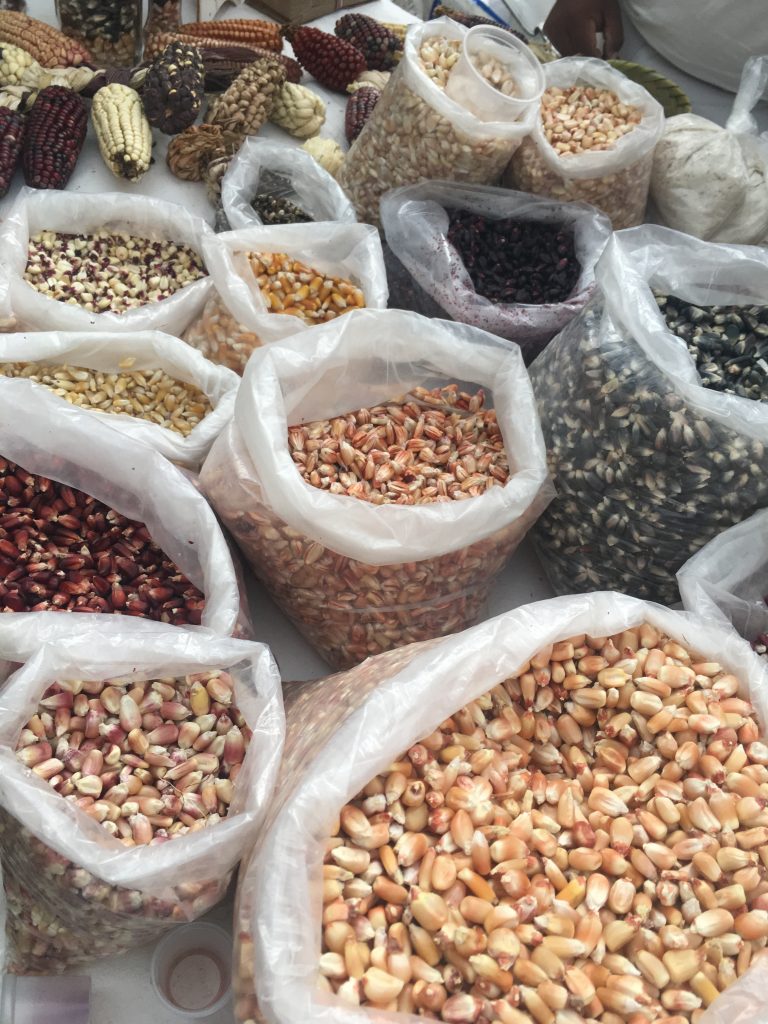by Silvia Ribeiro

To jail for saving seed from your own harvest. It sounds incredible, but this is the consequence that enforcement of laws granting intellectual property over seeds to large companies has had in several countries, with the protection of the UPOV agreement (International Union for the Protection of the Procurement of Plant Varieties), an institution that this week turns 60. It could happen in México with the reform of the Federal Law of Plant Varieties proposed by congressman Eraclio Rodríguez, who argues that it is to harmonize it with the T-MEC (United States, Mexico, Canada trade agreement) and other free trade treaties. Rodriguéz is not being original, he simply follows the guidelines dictated by transnational seed and agrochemical companies like Bayer, Syngenta and Corteva. It is they who will benefit from the regulations to privatize seeds (https://tinyurl.com/yc285u3k).
Their objective is not food, but profit; they see seeds only as a link in the chain of industrial agri-food, monopolizing them as a key step in controlling the entire chain. That is why they have promoted the privatization of seeds with plant breeder’s rights and patents. Against this process, which is a way to criminalize campesino life and the sovereign production of foods, there is a global campaign being carried out against the UPOV and the privatization of seeds, supported by 285 organizations from 47 countries between December 2 – 8 (#StopUPOV).
One form of imposition of UPOV provisions has been precisely the free trade agreements. In the context of the campaign, Grain this week published an interactive map of these treaties and which countries are pushing them. It remains visually very clear that it is a process of neocolonialism. A few countries, led by the United States and Euroope — home to the transnational seed companies — look to ensure the protection of the privileges of these companies in the countries of the south, especially where a great diversity exists and they seek to monopolize originate. (https://grain.org/e/6768)
Privatizing seeds is in itself an absurd concept, as they are a collective and fluid creation that began with women who more than 10 thousand years agos devised ways of cultivating that which previously had only been collected, giving rise to agriculture and human settlements. Exchanging and saving seeds for the harvests to come is to agriculture like the air that we breathe. As Camila Montecinos of the Association of Rural and Indigenous Women of Chile expresses, the constant conversations of the communities that sow with the seeds, the soils, the crops, the forests, mountains and plains, the water sources, the needs for food, shelter, artistic and spiritual tastes and expressions, the ways of controlling illnesses and many other interactions is what keeps the seeds alive and continuously creates new ones. Never is it an individual creation, they are always collective weavings that start from previous seeds and are the basis for future ones. (https://tinyurl.com/5ekmz2vv).
In the same vein, the Mayan Network of Seed Guardians spoke out against UPOV and other projects that infringe on community life and indigenous autonomy (https://tinyurl.com/2p8usv8m)).
The process of creation has taken more than 10 thousand years and cannot be individualized. For this reason, the companies invented an absurdity to claim their property: that whoever develops a seed variety in a laboratory can allege that it is their invention, their breeding and therefore ask for a breeder’s certificate that prevents others from using that variety, despite the fact that it is based on thousands of years of collective creation. To give this theft an international framework, UPOV was created. At the beginning, it only restricted commercial use for 5-7 years. Successive changes resulted in the 1991 version of the convention, that granted exclusivity for more than 20 year, criminalizes and persecutes peasant and farmer exchanges, seriously restricts access to the seed for public research, allows obtaining permits even including for discoveries, extends this protection to similar varieties to that which was developed, and affirms the criminalization and penalization of those who don’t comply.
All over the world, but especially in the countries of the global south who are members of UPOV, the certificates granted follow a pattern: more than 90 percent of the applicants are giant transnational companies or their subsidiaries. Basically, it is a way of safeguarding corporate privileges in each country and enabling them to use the national repressive and legal apparatus against the campesinos, farmer and public research investigations. In many cases with corn, beans, squash, nopal, amaranthe and flowers like cempasúchil (marigold) or cuitlaxochitl (the poorly-named poinsettia) exclusive rights are granted to transnational corporations for crops with centers of origin and diversity in the very countries that cede them, a case repeated in Mexico.
The ambition of these corporations has no end, nor will the increase of restrictions and penalizations that they want to impose to secure their privileges through the UPOV and other systems of intellectual property, like patents. For this reason, the campaign demands an end to the institution. It is just a start.
* Investigadora del Grupo ETC
This article was published in La Jornada on December 4th, 2021. https://www.jornada.com.mx/2021/12/04/opinion/016a1eco. English interpretation by Schools for Chiapas.
